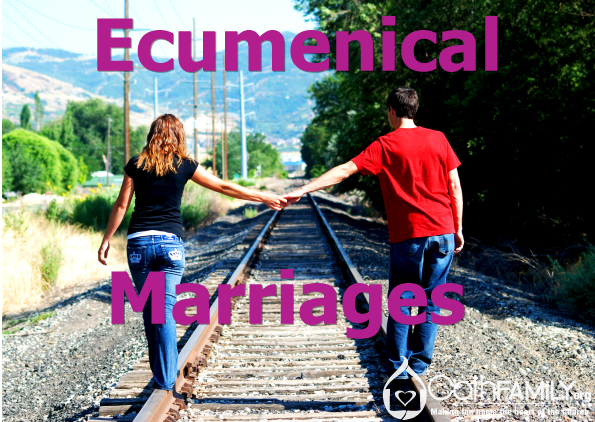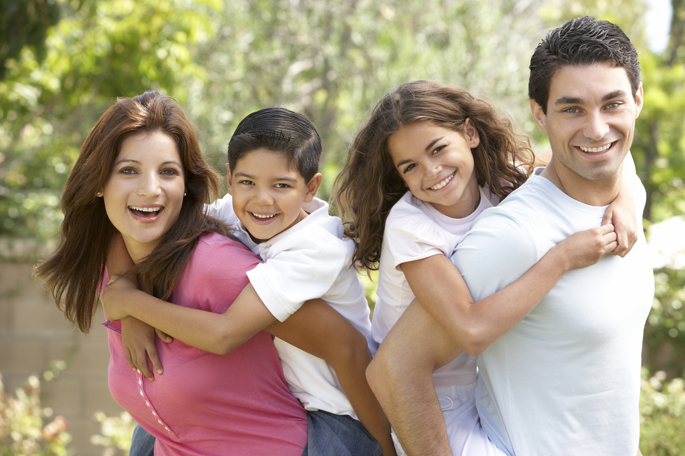Ecumenical Marriages

Jesus prayed that we “may all be one” in faith. Married couples of two different Christian traditions are perfectly placed to be living examples of Christian unity. They show the world the way forward to unity between the Christian churches.
‘That they may all be one’
‘Ecumenism’ comes from the Greek word οἰκουμένη (oikoumene) which refers to the inhabitants of the entire world. In the Catholic Church, ecumenism refers to the unity of Christians in the Body of Christ, the Church. But we generally think of ecumenism as the work of dialogue and prayer between the various Christian churches to promote understanding and unity.
Pope John Paul II said that promoting Christian unity is not just an appendix which is added on to the Church’s activity, but “an organic part of her life and work”. Recently on the global scale we’ve seen a movement towards Christian unity between the Catholic Church and members of the Anglican tradition. But we see it most clearly in ecumenical marriages, where a couple because of their love for one another are strongly motivated to respect each other’s religious differences and to seek growth in faith together.
Quite simply and naturally, just in their day-to-day life together and in the way they raise their children or work in the community, these couples live out their commitment to Jesus and his Gospel side-by-side. The different Christian churches, some of them with centuries of mistrust or opposition between them, could learn a lot from these married couples about working together and appreciating the good in the other! Marriages between Christians of different faith traditions provide the most natural and most powerful spaces for the life of Christian unity to grow and impact on the wider community.
Ecumenical Marriage
We usually think of the Church as occurring at three levels: the diocese, the parish and the family. Families are the first centres of a living, radiant faith. They are place where we first learn to love and to get along with each other, to bear with each other, forgive each other and to sacrifice for each other. If the family is a domestic church, the in an ecumenical marriage we see a domestic church which unifies in a practical way Christians from different traditions.
A couple in an ecumenical marriage has a strong incentive to find common ground among their different traditions, especially in the anticipation of raising children, and to bear with the differences in a sensitive way which respects each other’s free will and their ongoing faith journey.
Ecumenical marriages are a powerful force to help unify Christianity, and a sign of Christian unity already present in the world today.
A Story
When my husband converted to the Catholic faith, I expected our marriage to become more like my parent’s; praying together and sharing each other’s spiritual values. Since my husband’s Catholic faith is still very new and young, I have to keep reminding myself to be paitent and allow him to grow and express his faith in his own way without the pressure to conform to my expectations.
Misconceptions, Myths and Prejudice
 Christians, like all human beings are sinful. We make mistakes, act selfishly and hurt others. Even spiritual leaders and future saints stuff up sometimes and fail to live by the moral standards they profess.
Christians, like all human beings are sinful. We make mistakes, act selfishly and hurt others. Even spiritual leaders and future saints stuff up sometimes and fail to live by the moral standards they profess.
For those outside of our faith, seeing these sinful mistakes can be a real turn off. Many people look at the clergy sexual abuse reported in the media and wonder how anyone can choose to be part of the Catholic Church.
This can be a cause of added tension for the Ecumenical couple where the non-catholic spouse may question the wisdom of raising their children in the Catholic faith. It is important to remember that. The Church is bigger than the sum of its sinful members and the values it proclaims; love, justice, truth and mercy, have merit beyond the behaviour of imperfect Christians.
Living the Tension – A story
Although baptised a Catholic, my husband is an atheist. From our very first date, he has been supportive of my faith and respects my commitment to raise our children as Catholics. He often comes to Mass with us. As an intellectual, he likes to debate and discuss, so I have chosen to join a parish community known for its stimulating homilies as this is an aspect in which he can engage. Like all couples, we don’t agree on some things and this is always hard to negotiate especially when it involves a moral teaching of the Church. Although, I am grateful that he honours his commitment to allow me to raise the children in the faith, at times it is lonely – I would love to be able to share my faith more deeply with him.
I don’t know what the future holds for us, but I trust that if I live my part faithfully, God will make the path clear.
The Ecumenical Family
It can be difficult for parents to explain to children why Mum or Dad doesn’t attend Mass. One parent explains it with the analogy of fruit: “as Catholics we’re like apples and Dad as an Anglican is like a pear, but we’re all fruit and we’re all in the fruit bowl”. This wise mother is careful not to communicate religious superiority, though as they get older, children will need a more thorough answer.
The challenge of maintaining a commitment to Mass attendance can be particularly difficult for mixed-faith parents; children who are bored by Mass will ask why they can’t stay at home with Mum or Dad.
It can be helpful to attend a family Mass and in our parish, the morning tea after the family Mass is a big hit with the kids. Another good strategy is to create positive ‘post-Mass’ traditions where the whole family gets a treat like ice-creams or a play in the park afterwards.
Prayer for Unity
In his encyclical Ut Unum Sint (On Commitment to Ecumenism), Pope John Paul II wrote that along the ecumenical path to unity, pride of place belongs to different types of shared prayer, “the prayerful union of those who gather together around Christ himself”. Christians must constantly pray and work to maintain, reinforce, and perfect the unity that Christ showed he wanted for us when he prayed at the beginning of his Passion: “I ask not only on behalf of these, but also on behalf of those who will believe in me through their world, that they may all be one.” (John 17:21)
What’s most important for children is for parents to focus on what unites them rather than their differences. Mixed-faith parents need to find common ground and build the family’s faith life on that, adopting faith rituals in which both feel comfortable. For example, grace before meals, prayers at bedtime and reading bible stories together are simple traditions that can be adapted in style and language to accommodate both spouses.
Sources and links:
- Scripture quotes from the New Revised Standard Version
- Jason E. King, Ecumenical Marriages as Leven for Christian Unity
- Pope John Paul II, Message of John Paul II to the Participants in the Plenary Assembly of the Pontifical Council for Promoting Christian Unity
Authors: Marilyn Rodigues & Francine Pirola
This article featured in the July 2012 edition of the CathFamily e-Magazine. For more, check out:


